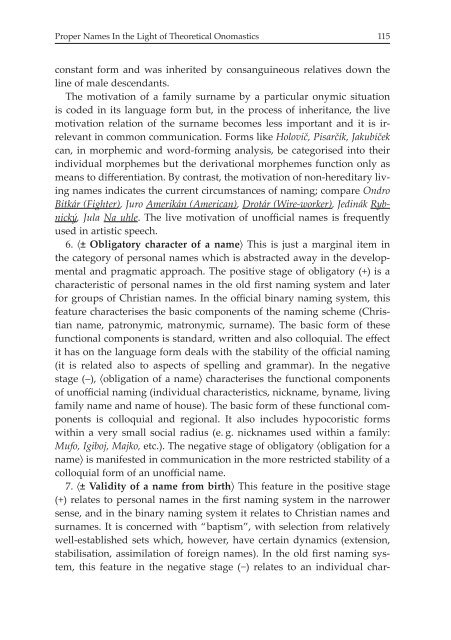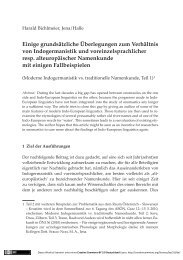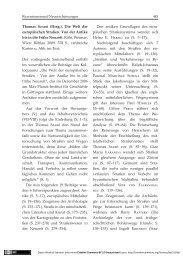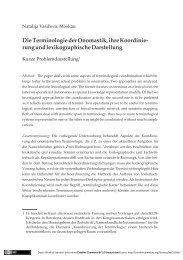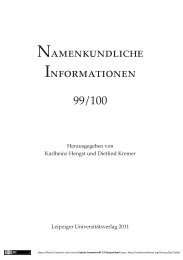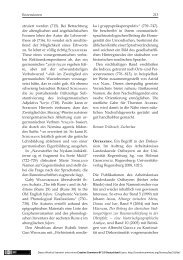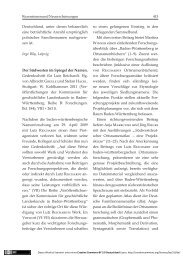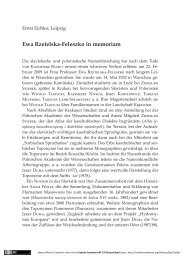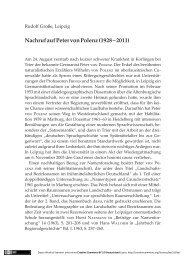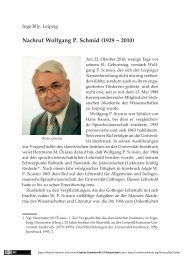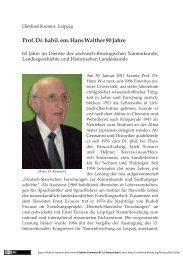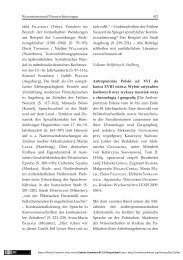Proper Names in the Light of Theoretical Onomastics
Proper Names in the Light of Theoretical Onomastics
Proper Names in the Light of Theoretical Onomastics
You also want an ePaper? Increase the reach of your titles
YUMPU automatically turns print PDFs into web optimized ePapers that Google loves.
<strong>Proper</strong> <strong>Names</strong> In <strong>the</strong> <strong>Light</strong> <strong>of</strong> <strong>Theoretical</strong> <strong>Onomastics</strong>115constant form and was <strong>in</strong>herited by consangu<strong>in</strong>eous relatives down <strong>the</strong>l<strong>in</strong>e <strong>of</strong> male descendants.The motivation <strong>of</strong> a family surname by a particular onymic situationis coded <strong>in</strong> its language form but, <strong>in</strong> <strong>the</strong> process <strong>of</strong> <strong>in</strong>heritance, <strong>the</strong> livemotivation relation <strong>of</strong> <strong>the</strong> surname becomes less important and it is irrelevant<strong>in</strong> common communication. Forms like Holovič, Pisarčík, Jakubíčekcan, <strong>in</strong> morphemic and word-form<strong>in</strong>g analysis, be categorised <strong>in</strong>to <strong>the</strong>ir<strong>in</strong>dividual morphemes but <strong>the</strong> derivational morphemes function only asmeans to differentiation. By contrast, <strong>the</strong> motivation <strong>of</strong> non-hereditary liv<strong>in</strong>gnames <strong>in</strong>dicates <strong>the</strong> current circumstances <strong>of</strong> nam<strong>in</strong>g; compare OndroBitkár (Fighter), Juro Amerikán (American), Drotár (Wire-worker), Jed<strong>in</strong>ák Rybnický,Jula Na uhle. The live motivation <strong>of</strong> un<strong>of</strong>ficial names is frequentlyused <strong>in</strong> artistic speech.6. 〈± Obligatory character <strong>of</strong> a name〉 This is just a marg<strong>in</strong>al item <strong>in</strong><strong>the</strong> category <strong>of</strong> personal names which is abstracted away <strong>in</strong> <strong>the</strong> developmentaland pragmatic approach. The positive stage <strong>of</strong> obligatory (+) is acharacteristic <strong>of</strong> personal names <strong>in</strong> <strong>the</strong> old first nam<strong>in</strong>g system and laterfor groups <strong>of</strong> Christian names. In <strong>the</strong> <strong>of</strong>ficial b<strong>in</strong>ary nam<strong>in</strong>g system, thisfeature characterises <strong>the</strong> basic components <strong>of</strong> <strong>the</strong> nam<strong>in</strong>g scheme (Christianname, patronymic, matronymic, surname). The basic form <strong>of</strong> <strong>the</strong>sefunctional components is standard, written and also colloquial. The effectit has on <strong>the</strong> language form deals with <strong>the</strong> stability <strong>of</strong> <strong>the</strong> <strong>of</strong>ficial nam<strong>in</strong> g(it is related also to aspects <strong>of</strong> spell<strong>in</strong>g and grammar). In <strong>the</strong> negativestage (–), 〈obligation <strong>of</strong> a name〉 characterises <strong>the</strong> functional components<strong>of</strong> un<strong>of</strong>ficial nam<strong>in</strong>g (<strong>in</strong>dividual characteristics, nickname, byname, liv<strong>in</strong> gfamily name and name <strong>of</strong> house). The basic form <strong>of</strong> <strong>the</strong>se functional componentsis colloquial and regional. It also <strong>in</strong>cludes hypocoristic formswith<strong>in</strong> a very small social radius (e. g. nicknames used with<strong>in</strong> a family:Mufo, Igiboj, Majko, etc.). The negative stage <strong>of</strong> obligatory 〈obligation for aname〉 is manifested <strong>in</strong> communication <strong>in</strong> <strong>the</strong> more restricted stability <strong>of</strong> acolloquial form <strong>of</strong> an un<strong>of</strong>ficial name.7. 〈± Validity <strong>of</strong> a name from birth〉 This feature <strong>in</strong> <strong>the</strong> positive stage(+) relates to personal names <strong>in</strong> <strong>the</strong> first nam<strong>in</strong>g system <strong>in</strong> <strong>the</strong> narrowersense, and <strong>in</strong> <strong>the</strong> b<strong>in</strong>ary nam<strong>in</strong>g system it relates to Christian names andsurnames. It is concerned with “ baptism”, with selection from relativelywell-established sets which, however, have certa<strong>in</strong> dynamics (extension,stabilisation, assimilation <strong>of</strong> foreign names). In <strong>the</strong> old first nam<strong>in</strong>g system,this feature <strong>in</strong> <strong>the</strong> negative stage (−) relates to an <strong>in</strong>dividual char-


